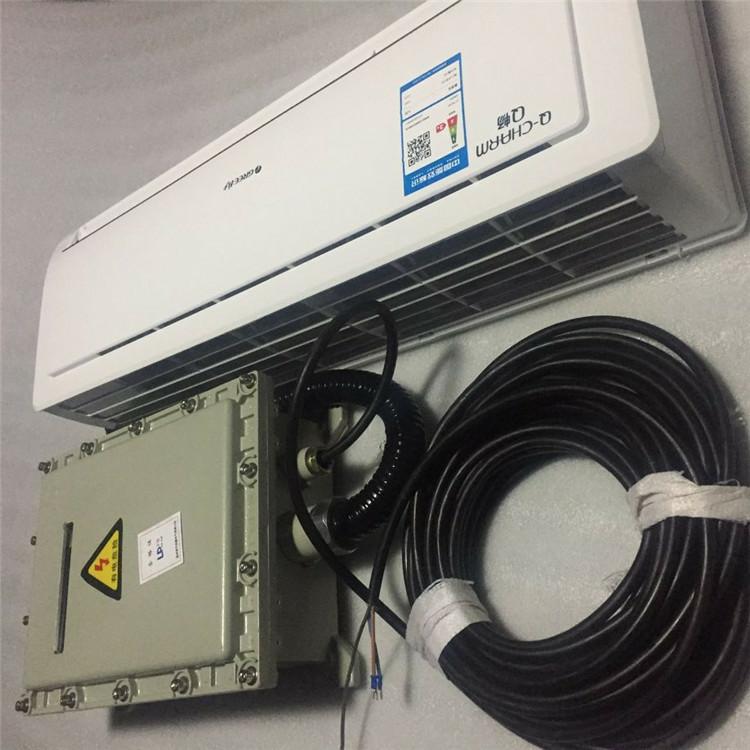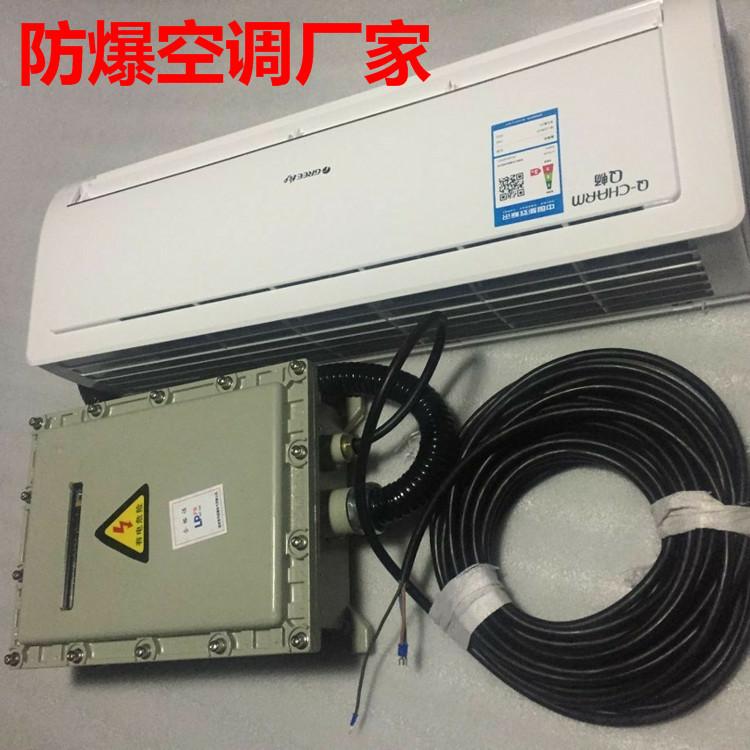What should I do if ice cubes fall out of the air outlet when the explosion-proof air conditioner is cooling?
What should I do if ice cubes fall out of the air outlet when the explosion-proof air conditioner is cooling? Below we have sorted out several common reasons:
1. The suction temperature is too high-mainly due to the increase in the degree of superheat of suction. Note that high suction temperature does not mean that the suction pressure is high, because the suction is superheated steam.
Under normal circumstances, the compressor cylinder head should be half cold and half hot. If the suction temperature is too high, the cylinder head will all heat up. If the intake temperature is higher than normal, the exhaust temperature will increase accordingly.
The main reasons for the high suction temperature are:
(1) The refrigerant charge in the system is insufficient, even if the expansion valve is opened to a large extent, there will be no change in the liquid supply, so that the refrigerant vapor is overheated in the evaporator and the suction temperature is increased.
(2) The opening degree of the expansion valve is too small, resulting in insufficient circulation of refrigerant in the system, the amount of refrigerant entering the evaporator is small, the degree of superheat is large, and the suction temperature is high.
(3) The expansion valve opening filter is clogged, the liquid supply in the evaporator is insufficient, the amount of refrigerant liquid is reduced, and a part of the evaporator is occupied by superheated steam, so the suction temperature increases. Explosion-proof air conditioner
(4) The suction temperature is too high due to other reasons, such as poor heat insulation of the return air pipeline or too long pipeline, which can cause the suction temperature to be too high.
2. The suction temperature is too low-mainly caused by the low suction superheat caused by the large liquid supply of the evaporator.
(1) Too much refrigerant charge, which occupies part of the volume of the condenser and increases the condensing pressure, and the liquid entering the evaporator increases accordingly. The liquid in the evaporator cannot be completely vaporized, so that the compressor sucks the gas with liquid droplets. In this way, the temperature of the return air duct decreases, but the evaporation temperature does not change because the pressure does not decrease, and the degree of superheat decreases. Even if the expansion valve is closed, there is no significant improvement.
(2) The opening of the expansion valve is too large. Because the temperature sensing element is too loosely bound, the contact area with the air return pipe is small, or the temperature sensing element is not wrapped with thermal insulation material and the position of the wrapping is wrong, etc., the temperature measured by the temperature sensing element is not accurate and is close to the ambient temperature, causing the expansion valve to operate The opening degree increases, resulting in too much liquid supply.
PS: Frost on the press-reason one: as above; cause two: insufficient refrigerant charge, it will be condensed from the evaporator to the compressor (note: need to be verified); reason three: the refrigerant is in the evaporator due to external reasons Insufficient or no evaporation will cause severe frosting and even wet compression. (If the return air of the central air conditioner is insufficient or the filter of the air conditioner is seriously blocked, the return air pipe of the compressor of the chiller unit will be frosted and the exhaust temperature is also very low)
3. Exhaust gas temperature is abnormal-influencing factors: adiabatic index, compression ratio, suction temperature
The compressor discharge temperature can be read from a thermometer on the discharge line. It is related to the adiabatic index of the refrigerant, compression ratio (condensing pressure / evaporating pressure) and suction temperature. The higher the intake temperature and the greater the compression ratio, the higher the exhaust temperature, and vice versa.
When the suction pressure is constant, the exhaust temperature rises when the exhaust pressure increases; if the exhaust pressure does not change, the exhaust temperature also increases when the suction pressure decreases. Both cases are caused by the increased compression ratio. Excessively high condensation temperature and exhaust temperature are detrimental to the operation of the compressor and should be prevented. Excessive exhaust temperature will make the lubricating oil thinner or even char and coking, which will deteriorate the lubrication conditions of the compressor. Explosion-proof air conditioner
The temperature of the exhaust gas is proportional to the compression ratio (condensing pressure / evaporating pressure) and the suction temperature. If the superheat temperature of the intake air is high and the compression ratio is large, the exhaust temperature will also be high. If the suction pressure and temperature remain unchanged, when the exhaust pressure increases, the exhaust temperature also increases.
The main reasons for the increase in exhaust temperature are:
(1) The intake temperature is higher, and the exhaust temperature after the refrigerant vapor is compressed is also higher.
(2) When the condensing temperature is increased, the condensing pressure is also high, causing the exhaust temperature to increase.
(3) The exhaust valve plate is crushed, the high-pressure steam is repeatedly compressed and the temperature rises, the cylinder and the cylinder head are hot, and the temperature indicator on the exhaust pipe also increases.
The actual factors that affect the rise of exhaust temperature are: low intercooling efficiency, or too much scale in the intercooler affects heat exchange, then the intake temperature of the latter stage must be high, and the exhaust temperature will also increase. Leakage of the valve and leakage of the piston ring not only affect the rise of the exhaust temperature, but also change the pressure between the stages. As long as the compression ratio is higher than the normal value, the exhaust temperature will increase. In addition, water-cooled machines, lack of water or insufficient water will increase the exhaust temperature. Condensation pressure is abnormal and discharge pressure is reduced.
4. The exhaust pressure is high-mainly caused by the high condensation pressure, not the press itself.
Exhaust pressure generally corresponds to the level of condensing temperature. Under normal circumstances, the discharge pressure of the compressor is very close to the condensing pressure.
As the condensing pressure increases, the compressor discharge temperature also increases. As the compression ratio of the compressor increases, the air transmission coefficient decreases, thereby reducing the compressor's cooling capacity. Increased power consumption. If the exhaust temperature is too high, it will increase the consumption of compressor lubricating oil, make the oil thinner and affect lubrication; when the exhaust temperature is close to the flash point of the compressor oil, it will also carbonize part of the lubricating oil and accumulate in the suction, The exhaust valve port affects the tightness of the valve.
Reducing the temperature of the cooling medium can cause the condensing temperature to drop and the condensing pressure to drop accordingly, but this is subject to environmental conditions and is difficult to choose. Increasing the cooling medium flow can reduce the condensation temperature a little (this method is mostly used). However, the flow of cooling water or air cannot be unilaterally increased, because this will increase the power of the cooling water pump or fan and motor, and should be comprehensively considered.
High exhaust pressure will increase the compression work and reduce the gas transmission coefficient, thereby reducing the cooling efficiency.
The main reason for this failure:
(1) The flow of cooling water (or air) is small and the temperature is high; 

(2) There is air in the system, which increases the condensing pressure;
(3) Too much refrigerant charge, the liquid occupies the effective condensation area;
(4) The condenser is out of repair for many years, and the heat transfer surface is seriously fouled, which can also cause the condensation pressure to increase. The presence of scale also has a greater effect on condensing pressure.
5. The exhaust pressure is too low-mainly caused by the refrigerant flow in the refrigeration system pipeline is too small or even stopped.
The exhaust pressure is too low. Although the phenomenon is manifested at the high-pressure end, the cause is mostly at the low-pressure end. The reason:
Ice or dirty plugging of the expansion valve and clogging of the filter will inevitably reduce the suction and discharge pressures.
Car Wahing Mitt,Car Gloves,Car Driving Gloves,Car Gloves Leather
Foshan SUMEITE Grinding Technology Co.,Ltd , https://www.aedetail.com